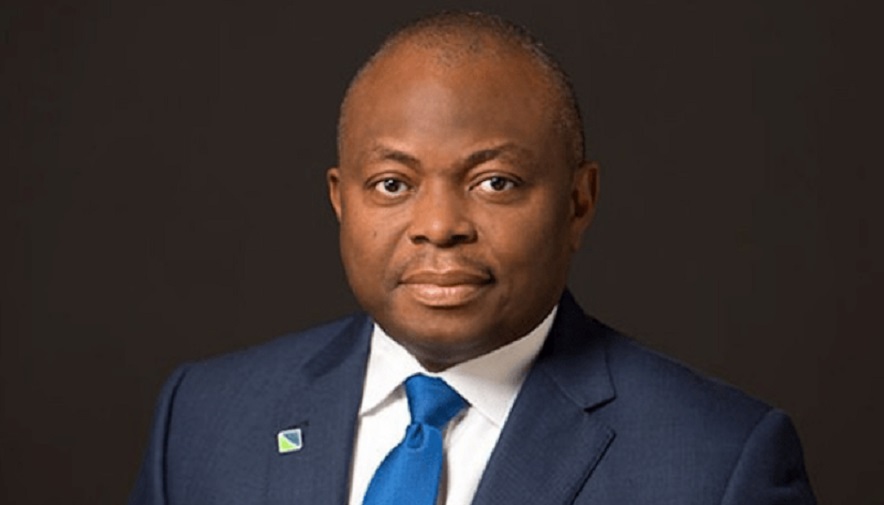Economy
FBN Holdings to Improve Operating Model for More Efficiencies

By Dipo Olowookere
The management of FBN Holdings Plc says its strategic focus in 2022 is revenue generation through digital channels and retail product offerings.
Reacting to the performance of the company in the 2021 financial year, the team stated that efforts would be made to further drive “our synergy potential as well as continue to improve our operating model to deliver more efficiencies.”
Last year, the organisation grew its gross revenue by 28.2 per cent to N757.3 billion, with profit before tax up by 99.1 per cent to N166.7 billion and the loans and advances growing by 30.0 per cent to N2.9 trillion.
In addition, the total assets appreciated by 16.2 per cent to N8.9 trillion, reaffirming its commitment to driving revenue and profitability as it completes the balance sheet clean-up.
A thorough analysis showed that the interest income remained challenged given the moderated interest rate environment negatively impacting yields; as a result, interest income declined 4.1 per cent to N369.0 billion from N384.8 billion in 2022.
To mitigate the effect of the low-interest rate on investment securities and revenue generation, the firm remained deliberate with its intensified deposit mobilization and funding strategy to support enhanced loan growth at optimised rates leading to a 5.7 per cent increase in interest expense to N140.8 billion from N133.2 billion a year earlier.
Conversely, non-interest revenue grew by 96.1 per cent to N364.6 billion from N185.9 billion on the back of increased fees and commission income, treasury activities and other operating income.
Additionally, and in line with its focus on further enhancing revenue generation capacity, First Pension Custodian Limited, a subsidiary of FBN Holdings’ flagship subsidiary, First Bank of Nigeria Limited, entered into a definitive agreement with Access Bank Plc for the planned acquisition of the entire share capital of Access Pension Fund Custodian Limited held by Access Bank Plc.
The idea behind this move is to boost its market share in the industry, aid revenue diversification and support annuity income as FBN Holdings plan to create quality loans with a focus on retail lending driven by technology as we continue to grow non-interest income to further diversify revenue.
In 2021, the company operated in a challenging operating environment that was pressured by high inflation and currency devaluation, the effect of which increased operating expenses by 14.2 per cent to N334.2 billion from N292.5 billion).
However, this 14.2 per cent is below the inflation level of 15.6 per cent in the previous year whilst regulatory costs also rose during the period, up 23.2 per cent y-o-y.
Despite the inflationary push factors, operating income grew 35.5 per cent to N592.8 billion from N437.6 billion, resulting in an improvement in cost to income ratio to 56.4 per cent from 66.8 per cent.
It was observed that in the year, deposits from customers increased by 19.5 per cent y-o-y to N5.9 trillion from N4.9 trillion, reaffirming its strong market access and robust funding base.
In the year, total assets grew by 16.2 per cent y-o-y to N8.9 trillion from N7.7 trillion driven by a 30.0 per cent y-o-y increase in customer loans and 26.3 per cent increase y-o-y in investment securities. Cash and balances with central banks, loans to banks & customers and investment securities constituted 87.2 per cent of total assets compared with 83.4 per cent of the preceding year.
The firm, while reacting to the figures, stated that, “As a financial service holding company, driving synergies remains a critical part of our strategy and has been integrated into every aspect of our delivery model.
“We pride ourselves in the uniqueness of our diversified portfolio and the collaborative ecosystem that we have built around our lines of business, our customers, and the unique value proposition that we deliver.
“We are also increasingly leveraging technology – artificial intelligence, robotics, and other next-generation technological advancements, to deepen collaboration and further drive operational efficiency across the group.”
“Following years of strategic restructuring of the Bank’s balance sheet and operations, the commercial banking business is beginning to transition into a sustained growth phase delivering performance commensurate to the size of our business and capabilities of our people. Profit before tax is up 77.9 per cent, gross earnings 30.3 per cent, total assets 15.9 per cent and customer deposits up 19.5 per cent.
“We continue to record progress in Asset Quality and Risk Management stemming from our retooled and strengthened risk management architecture.
“On the back of this, non-performing loan ratio further declined to 6.1 per cent from 7.7 per cent while coverage ratio improved to 62.2 per cent from 48.0 per cent.
“With a cleaner balance sheet and resilient earnings-generating capacity, First Bank (Nigeria) was able to accrete capital buffers from organic earnings. Hence, despite the increase in loans and advances, Capital Adequacy Ratio (CAR) remained steady, marginally increasing to 17.4 per cent versus 17.0 per cent in 2020,” it added.
Economy
Seven Price Gainers Boost NASD OTC Bourse by 2.19%

By Adedapo Adesanya
Seven price gainers flipped recent declines at the NASD Over-the-Counter (OTC) Securities Exchange, raising the alternative stock market by 2.19 per cent on Friday.
According to data, the market capitalisation added N51.24 billion to end N2.389 trillion compared with the previous day’s N2.338 trillion, while the NASD Unlisted Security Index (NSI) climbed 85.65 points to close at 3,994.32 points, in contrast to the 3,908.67 points it ended a day earlier.
Business Post reports that the advancers were led by MRS Oil Plc, which improved its value by N13.00 to N200.00 per share from N187.00 per share, FrieslandCampina Wamco Nigeria Plc gained N7.40 to settle at N91.55 per unit versus the previous day’s N84.15 per unit, Central Securities Clearing System (CSCS) Plc appreciated by N6.08 to N71.00 per share from N64.92 per share, Afriland Properties Plc added 66 Kobo to finish at N17.17 per unit versus N16.51 per unit, IPWA Plc rose 37 Kobo to N4.15 per share from N3.78 per share, First Trust Mortgage Bank Plc grew by 11 Kobo to N1.20 per unit from N1.09 per unit, and Food Concepts Plc went up by 10obo to N3.70 per share from N3.60 per share.
On the flip side, there were two price losers led by Geo-Fluids Plc, which depreciated by 28 Kobo to N3.32 per unit from N3.60 per unit, and Industrial and General Insurance (IGI) Plc dropped 5 Kobo to sell at 45 Kobo per share from 50 Kobo per share.
Yesterday, the volume of trades went down by 92.0 per cent to 3.7 million units from 45.8 million units, the value of transactions fell by 59.4 per cent to N84.5 million from N208.2 million, while the number of deals went up by 7.7 per cent to 42 deals from 39 deals.
CSCS Plc remained the most traded stock by value (year-to-date) with 32.6 million units exchanged for N1.9 billion, trailed by Geo-Fluids Plc with 119.6 million units valued at N470.3 million, and Resourcery Plc with 1.05 billion units traded at N408.6 million.
Resourcery Plc closed the day as the most traded stock by volume (year-to-date) with 1.05 billion units sold for N408.7 million, followed by Geo-Fluids Plc with 119.6 million units worth N470.3 million, and CSCS Plc with 32.6 million units worth N1.9 billion.
Economy
FX Demand Worries Weaken Naira to N1,346/$1 at Official Market

By Adedapo Adesanya
The Naira weakened further against the United States Dollar in the Nigerian Autonomous Foreign Exchange Market (NAFEX) on Friday, February 20, by N4.97 or 0.37 per cent to N1,346.32/$1 from the N1,341.35/$1 it was transacted on Thursday.
Heightened FX demand tilted the market toward the downside yesterday, exerting upward pressure on rates despite efforts by the Central Bank of Nigeria (CBN) to stabilise the foreign exchange market.
Also in the official market, the domestic currency depreciated against the Pound Sterling during the session by N9.39 to sell for N1,815.25/£1 versus the previous day’s N1,805.86/£1, and lost N7.33 against the Euro to close at N1,584.62/€1 compared with the preceding session’s N1,577.29/€1.
The story was not different for the Nigerian Naira at the GTBank FX desk, where it depleted against the Dollar by N7 on Friday to quote at N1,356/$1 versus the N1,349/$1 it was sold a day earlier, but remained unchanged in the black market at N1,370/$1.
It was observed that risky sentiment among Foreign Portfolio Investors (FPIs) contributed to the FX market, amid fears of hot money flight due to capital gains tax and other factors.
As for the cryptocurrency market, it was mostly green yesterday in reaction to a Supreme Court verdict dismissing a fresh 10 per cent global levy by President Donald Trump.
The apex court on Friday described Mr Trump’s global tariff rollout as illegal. The decision did not clarify what should happen to tariff revenue already collected, and it doesn’t necessarily spell the end of the trade agenda, with multiple legal and executive avenues still available.
Litecoin (LTC) grew 2.7 per cent to $55.00, Cardano (ADA) appreciated 2.6 per cent to trade at $0.2815, Binance Coin (BNB) expanded by 2.6 per cent to $627.19, Dogecoin (DOGE) recouped 1.3 per cent to quote at $0.1, Ripple (XRP) jumped 0.7 per cent to $1.43, Solana (SOL) improved by 0.5 per cent to $84.15, and Ethereum (ETH) soared 0.1 per cent to $1,962.78.
However, Bitcoin (BTC) lost 0.2 per cent to sell for $67,850.49, while the US Dollar Tether (USDT) and the US Dollar Coin (USDC) traded flat at $1.00 each.
Economy
Fidson, Jaiz Bank, Others Keep NGX in Green Territory

By Dipo Olowookere
A further 0.99 per cent was gained by the Nigerian Exchange (NGX) Limited on Friday after a positive market breadth index supported by 53 price gainers, which outweighed 23 price losers, representing bullish investor sentiment.
During the trading day, the trio of Jaiz Bank, Fidson, and NPF Microfinance Bank chalked up 10.00 per cent each to sell for N11.00, N86.90, and N6.27, respectively, while Deap Capital appreciated by 9.96 per cent to N7.62, and Mutual Benefits increased by 9.94 per cent to N5.42.
Conversely, Secure Electronic Technology shed 10.00 per cent to trade at N1.62, Sovereign Trust Insurance slipped by 9.73 per cent to N2.32, Ellah Lakes declined by 7.91 per cent to N12.80, International Energy Insurance retreated by 5.56 per cent to N3.40, and ABC Transport moderated by 5.26 per cent to N9.00.
Data from Customs Street revealed that the insurance counter was up by 2.52 per cent, the industrial goods sector grew by 2.28 per cent, the banking space expanded by 1.43 per cent, the consumer goods index gained 1.23 per cent, and the energy industry rose by 0.05 per cent.
As a result, the All-Share Index (ASI) went up by 1,916.20 points to 194,989.77 points from 193,073.57 points, and the market capitalisation moved up by N1.230 trillion to N125.164 trillion from Thursday’s N123.934 trillion.
Yesterday, investors traded 820.5 million stocks valued at N28.3 billion in 63,507 deals compared with the 898.5 million stocks worth N38.5 billion executed in 61,953 deals, showing a jump in the number of deals by 2.51 per cent, and a shortfall in the trading volume and value by 8.68 per cent and 26.49 per cent apiece.
Closing the session as the most active equity was Mutual Benefits with 79.0 million units worth N427.1 million, Zenith Bank traded 44.0 million units valued at N3.8 billion, Chams exchanged 43.9 million units for N182.0 million, AIICO Insurance transacted 42.4 million units valued at N179.8 million, and Veritas Kapital sold 36.0 million units worth N90.6 million.
-

 Feature/OPED6 years ago
Feature/OPED6 years agoDavos was Different this year
-
Travel/Tourism10 years ago
Lagos Seals Western Lodge Hotel In Ikorodu
-

 Showbiz3 years ago
Showbiz3 years agoEstranged Lover Releases Videos of Empress Njamah Bathing
-

 Banking8 years ago
Banking8 years agoSort Codes of GTBank Branches in Nigeria
-

 Economy3 years ago
Economy3 years agoSubsidy Removal: CNG at N130 Per Litre Cheaper Than Petrol—IPMAN
-

 Banking3 years ago
Banking3 years agoSort Codes of UBA Branches in Nigeria
-

 Banking3 years ago
Banking3 years agoFirst Bank Announces Planned Downtime
-

 Sports3 years ago
Sports3 years agoHighest Paid Nigerian Footballer – How Much Do Nigerian Footballers Earn



















